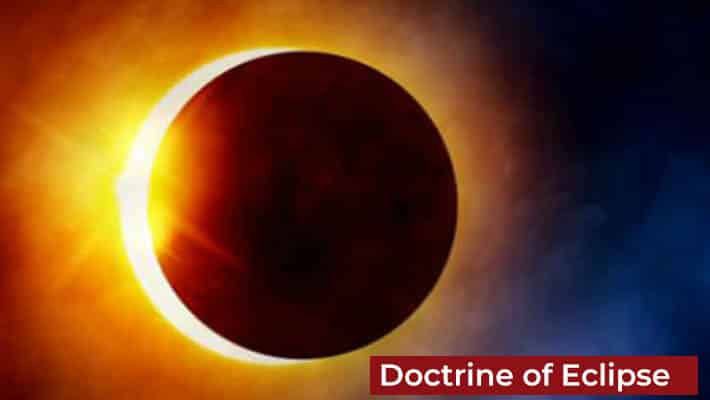
DOCTRINE OF ECLIPSE
Any existing law that is in conflict with fundamental rights does not instantly become invalid under Indian law. We call it the doctrine of eclipse. The contentious law might become enforceable if the Indian Constitution of 1950 is suitably changed to bring it into accordance with fundamental rights.
This doctrine of eclipse in Indian constitution primary idea is that fundamental rights are prospective in nature. Any pre-constitutional law that infringed against the fundamental rights enumerated in the Indian Constitution of 1950 would not be deemed unconstitutional since those rights did not exist at the time the law was created.
Doctrine of eclipse meaning
As per doctrine of eclipse meaning:
- The doctrine of eclipse meaning states that laws that violate fundamental rights do not necessarily mean that they are void.
- This doctrine of eclipse in Indian constitution primary idea is that fundamental rights are prospective in nature.
- Part III will be void to the extent of any inconsistency between the provisions of this Part and any laws in effect in India immediately prior to the adoption of this Constitution, as stated in Article 13 1 of Indian constitution, which is a section pertaining to fundamental rights.
- The rights and duties acquired before to the ratification of the Constitution are covered by them since they are in effect for all past transactions.
- Those who are not entitled to basic rights, such as non-citizens, are nonetheless bound by these laws.
- As a result, the disputed statute is still concealed beneath the fundamental rights and might be reinstated if the discrepancy is fixed.
- Article 13 1 of Indian constitution example: a court change how it interprets a statute, decisions made previously based on that interpretation are still enforceable, but cases determined in the future must adopt the updated reading.
Doctrine of eclipse in Indian constitution: Elements
Some of the essential elements of the doctrine of eclipse include the following:
- Pre-Constitutional Law: This notion applies to laws enacted before the Constitution was drafted.
- Conflicting with Fundamental Rights: Any applicable laws must manifestly conflict with the fundamental freedoms guaranteed by the Constitution.
- Inoperativeness rather than Nullity: The law does not entirely vanish from existence. Instead, it ceases to function or is inapplicable to those for whom the law is violating fundamental rights.
- Potential of Future Operativeness: Should the relevant basic right be modified in the future; the previously contested law will immediately revert to its former state of operation. This suggests that the law can be put into effect and enforced once a constitutional amendment settles the disagreement with fundamental rights.
Doctrine of Eclipse:article 13 1 of indian constitution Case Laws
- In Keshav Madhav Menon v State of Bombay, the appellant was prosecuted for publishing a pamphlet titled “Railway MazdoorankeKhilaf Nai Zazish” without permission, using the Indian Press (Emergency Powers) Act, 1931. During the lawsuit, the Indian Constitution went into effect. Consequently, questions concerning the term “void” and the prospective and retroactive character of Article 13(1) were raised.
The main question was whether the disputed Act violated Article 19(1)(a) and, if so, if it should be declared illegal. The Court decided that the Act was merely void to the degree of the infringement and that the word “void” in Article 13 does not mean that all laws or provisions are completely repealed.
- Because Ambica Mills was not a citizen, the court determined that she could not use Article 13(2) to declare the law unconstitutional in the State of Gujarat v Ambica Mills case.
The Court reasoned that since non-citizens are not awarded any rights under Article 19, laws that infringe citizens’ fundamental rights under Article 19(1)(f) are void against citizens who have been granted such rights. This means that legislation is only void to the extent that it breaches the rights guaranteed to citizens. Nevertheless, non-citizens are subject to the law.
The notion maintains pre-constitutional regulations that violate the fundamental rights guaranteed by Part III of the Indian Constitution. These laws are not declared void outright; rather, they are declared inactive and unenforceable only to the extent that they infringe upon basic rights.
But if the Parliament later alters the Constitution to remove any inconsistency or clash between the existing legal system and the fundamental rights, then the eclipse disappears. The particular legislation is in effect and enforceable once the disparity has been resolved.
The doctrine of eclipse essentially provides a means of for pre-constitutional laws that infringe upon fundamental rights to be put on hold for a while. Later, the laws can be brought back to life and rendered legally binding through constitutional changes that resolve the inconsistency.
For any latest news, legal topics, judiciary exams notifications, patterns, etc watch Jyoti Judiciary’s YouTube channel for legal videos for any updates at https://youtube.com/@jyotijudiciarycoaching4852?si=2cwubh9d2A9urwJf


